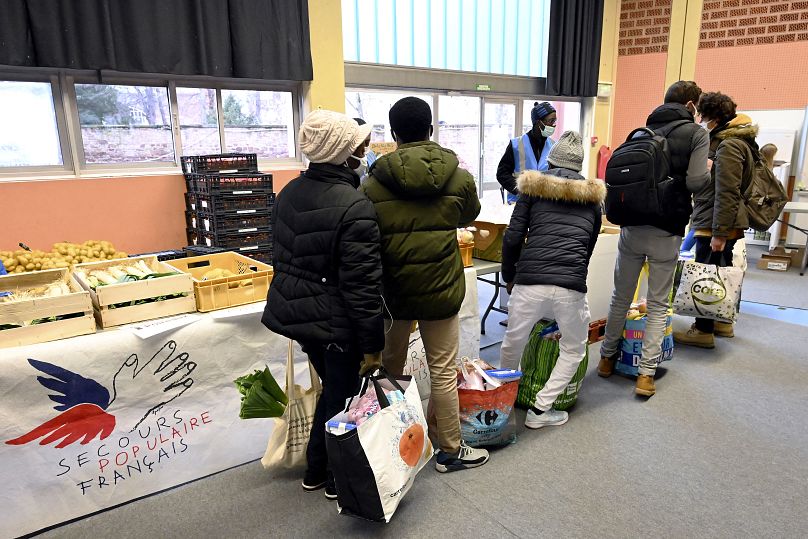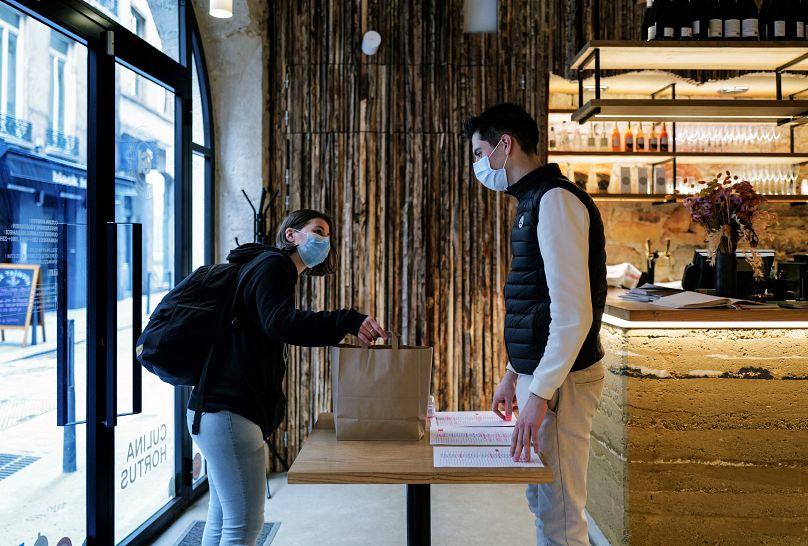Euronews looks at the toll the coronavirus pandemic has taken on Europe's students and how governments across the bloc have responded to support their youth.
"It is hard to be 20 in 2020," French President Emmanuel Macron said last year, referring to the devastating impacts of the pandemic on young people.
The statement still holds true in the first months of 2021.
"Being 21 in 2021 means being lonely and hungry," Belgian students chanted as they took to the streets of Brussels last week.
With the rise of new virus variants and fresh restrictions in many countries, most universities across Europe remain closed, while student jobs have become a thing of the past.
European students are feeling the impact, not only on their education and daily lives but also on their socio-economic status and mental health.
Euronews looks at the toll the coronavirus pandemic has taken on Europe's "lockdown generation" and how governments across the bloc have responded to support their youth.
Educational impacts
Three-quarters of students in Europe have had their school or university completely closed during the pandemic, according to data provided by the European Youth Forum based on a survey on young people and the pandemic.
9.7% of young students are not getting any courses, teaching or testing. This number rises to 15.2% for the most disadvantaged, according to the same source.
For the vast majority of European students, education now happens almost exclusively online.
Paula Sos, a 23-year-old Spanish student from Castellon province, was supposed to take part in two Erasmus programmes abroad this year. Instead, she went back to her parents and is following online classes.
Students fear the quality of education is diminishing due to less face-to-face time with teachers, said Nikita Sanaullah, a Senior Policy Officer on Social & Economic Inclusion at the European Youth Forum.
An estimated two-thirds of European students say they have been learning less since the beginning of the pandemic, according to data compiled by the youth organisation. This rises to around three quarters for the most disadvantaged.
Last week, hundreds of Belgian students took to the streets of Brussels to request a partial return to class.
"We are here to resume face-to-face classes and for a little more money," protesters chanted.
Nell, a 19-year old Belgian first-year student who took part in the protest, told AFP that she was "tired" of taking online courses in a shared flat with an unreliable internet connexion.
"If it starts like this again next year, I won't be able to continue my studies and I don't know what I'll do," Nell said.
Students from vulnerable and marginalized groups are at risk of "being completely left out of education," Sanaullah warned, expressing particular concern for students from a migrant background, students with a disability or from other minority groups.
Socio-economic impacts
The crisis hasn't only affected students' education but also their economic survival due to the loss of students jobs.
"Most young people do jobs on the side, primarily in the food retail and entertainment sectors, which have been obviously quite substantially hit by the pandemic," Sanaullah noted.
The crisis has thus affected young people's ability to pay for their basic costs of living. France for instance has seen thousands of students line up at food banks in recent months, in numbers unheard of before the pandemic.
"Typically if you're young, you also have limited financial assets at your disposal. That means you're at a higher risk of falling below the poverty line," Moritz Ader, a policy analyst at OECD, told Euronews.
The multilateral organisation has recently published a study on young people and COVID-19 based on survey findings from 90 youth organisations from 48 countries.
"We're hearing quite a lot of stories of students having to drop out as a result of financial issues," Sanaullah said.
"How can you join online lessons if you're struggling to pay for your internet?" she pondered.
"Young people are more likely to live in overcrowded housing, which makes it difficult to have adequate space and privacy for remote learning," she continued.
In Ireland, young people are not allowed to access student accommodation and yet they are not able to get refunds for their housing costs, the European Youth Forum officer told Euronews. "This is an impossible situation."
Even more worrying is that young Europeans may still feel the socio-economic impact of the current crisis for many years.
"Such crises can have so-called scarring effects, so they will have an impact on the long-term career path and future of young people," Ader told Euronews. The OECD estimates that a lost school year can lead to a loss of up to 10% of lifetime income.
Inequality among young people already existed before the pandemic, the expert noted, and the crisis "has only exacerbated them." "The same holds true for inequalities between different age cohorts," Ader went on.
Yet solidarity between generations has remained strong, Ader said, contributing in many cases to mitigating the socio-economic impacts of the pandemic.
"Fortunately I have been able to be next to my family and have not suffered the awful consequences of the pandemic," student Paula Sos told Euronews.
Impact on mental health
Isolation, economic hardship, concerns over their education and uncertainty over their future have taken a heavy toll on young people's mental health.
"Young adults (aged 18 to 29) experience higher level of distress compared to other age groups since the onset of the pandemic," the OECD report read, citing evidence from a study conducted in the UK.
“There’s lots of anecdotal evidence of a crisis-driven rise in hospitalisations and overflowing psychologists’ practices,” Julia Asbrand, a professor of child and youth psychology at Berlin’s Humboldt University, told The Associated Press news agency.
Nearly half of young people in Europe (48.8%) possibly have anxiety/depression disorders, according to the European Youth Forum.
The problem is such that the French government has granted last month a "check" for free psychological or psychiatric support to all students who feel the need for it.
Youth-led initiatives and community-based solidarity
Depicting students as mere victims of the pandemic would not do justice to the numerous initiatives they have implemented to mitigate its impacts.
The OECD report cites several examples across Europe.
Italian youth NGO "Nous," for instance, disseminated videos in different languages to inform people facing language barriers about anti-covid measures implemented by the government.
In the Netherlands, the Youth Impact campaign connected younger and older generations through online platforms and phone calls to help combat the loneliness of the elderly.
Students have also benefited from community-led solidarity initiatives.
For example, the restaurant Culina Hortus in Lyon, France -- which was awarded "best vegetarian restaurant in the world" in 2020 -- offered one hundred Valentine's Day menus to students in need last month.
Government responses
"Essentially what we're seeing and what young students are telling us is that they feel completely left behind in the current response. They are not seen as a priority, " Sanaullah told Euronews.
The comments were echoed by Paula Sos who noted a "generalised feeling of abandonment".
"Obviously this varies very much from country to country," Sanaullah added, noting that Denmark for instance granted financial support to all students regardless of their means at the time of their registration. "These are great initiatives," she said.
Maria Tziamali, the President of Cypriot student union POFEN told Euronews in a written statement that their government had "provided considerable financial assistance, mainly to Cypriot students studying abroad."
In January, the French government announced a series of measures to alleviate the plight of students, including one-euro meals twice a day at university cafeterias and a return to campus one day a week, provided lecture halls and classrooms remain below 20% capacity.
But Sanaullah said European governments such as France or Belgium were starting to take action only after the students' situation became really desperate. "What we would like to see is a bit more of a preventative approach when it comes to supporting students," she told Euronews.
The difficulty, Sanaullah insisted, is that students are excluded from European welfare models because they are not considered unemployed.
Ader told Euronews it was crucial that governments maintain the level of resources directed to youth-led organisations. "The challenge is to keep up that mobilisation of youth-led organisations even beyond the crisis," he said.
Another key policy recommendation is to collect disaggregated data to understand how different age groups are impacted by the crisis, Ader noted.
"In designing new programs or allocating public resources, governments should anticipate how such decisions will affect young people to ensure that the solutions they offer are as just and fair as possible across different age cohorts. "
Every weekday at 1900 CET, Uncovering Europe brings you a European story that goes beyond the headlines. Download the Euronews app to get an alert for this and other breaking news. It's available on Apple and Android devices.













